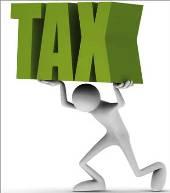 A proposal to introduce the tax deducted at source mechanism for service tax on the lines of income tax has been put on the back burner.
A proposal to introduce the tax deducted at source mechanism for service tax on the lines of income tax has been put on the back burner.
The finance ministry is instead thinking of expanding the list of services on which the tax would be levied under the reverse charge mechanism.
At present, usually the service provider collects tax at a rate of 12 per cent and deposits it with the government.
In a TDS mechanism, the recipient of the service is required to deduct the tax and deposit it with the government.
The service provider gets the credit for the amount deducted on the basis of the certificate issued by the deductor. Under the reverse charge mechanism, the service recipient is liable to make the payment and gets credit for the amount paid.
Earlier, the ministry was considering a proposal to introduce the TDS mechanism to check tax evasion and increase revenues.
A study group was formed last year to examine its feasibility.
However, it has shelved the plan, due to a lack of technology support for implementing the proposed mechanism.
More, it did not receive positive feedback from the industry on the issue.
"A lot of technological back-up is required for TDS on service tax and we are not ready.
"The Finance Act, 2012, has added three more services under the reverse charge
"The list can be expanded if it works out well," said an official who did not wish to be identified.
As the ministry wanted to check evasion by service providers, usually in the unorganised sector, it explored the possibility of the service recipient making the payment, as most of these were in the organised sector and it was easy to track their transactions.
Bipin Sapra, tax partner, Ernst & Young, said TDS for service tax was tried in some jurisdictions but had not been successful.
Reverse charge, he said, wa Rs s mainly used for import of services.
"In a goods & services tax, this has to go back to the original system, as TDS does not work on sale of goods," he added.
Sponsorship, a goods transport agency, an insurance agency, advocacy and works contracts are some services currently taxed on a reverse charge basis, as is import of services.
In the previous Budget, the government had also brought hiring of means of transport, construction and manpower supply under reverse charge.
TDS on service tax would have been similar to TDS on income tax, where the employer deducts tax at source before paying salary to the employee.
The industry feared a TDS mechanism in service tax would increase the compliance burden on the service receiver, while requiring the government to expand its information technology infrastructure for paying refunds in large numbers.











